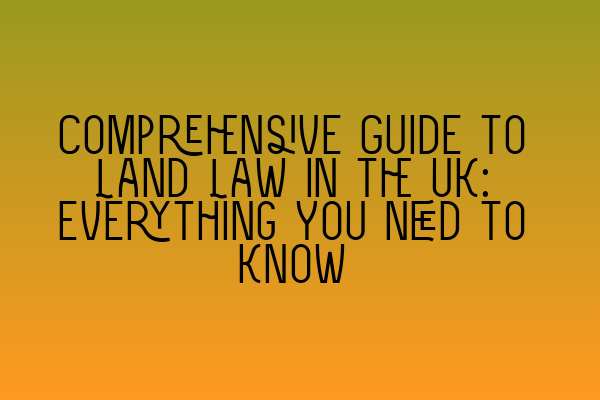Comprehensive Guide to Land Law in the UK: Everything You Need to Know
Welcome to the comprehensive guide to land law in the UK. Whether you are a property owner, a tenant, or just curious about the intricacies of land law, this guide will provide you with all the essential information you need to navigate this complex area of law. From understanding the different types of property ownership to the rights and obligations of landlords and tenants, we will cover it all. So, let’s dive in!
1. Introduction to Land Law
Land law governs the ownership, use, and transfer of real property. Real property refers to land and any buildings or structures attached to it. Understanding land law is crucial whether you are a homeowner, a tenant, or involved in any form of property transaction.
If you are preparing for your SQE (Solicitors Qualifying Exam) or interested in gaining a deeper understanding of land law, be sure to check out our comprehensive SQE 1 Practice Exam Questions and SQE 1 Practice Mocks FLK1 FLK2 to boost your knowledge and test your understanding.
2. Types of Property Ownership
There are various types of property ownership in the UK, each with its own legal implications. Let’s explore some of the most common forms:
a. Freehold Ownership
Freehold ownership refers to a situation where the individual owns the property and the land it sits on outright. This type of ownership provides the greatest level of control and is typically associated with houses and permanent structures. However, keep in mind that certain restrictions or covenants may still apply.
b. Leasehold Ownership
Leasehold ownership involves granting a lease for a specific period of time, typically long-term, to an individual, allowing them to occupy the property. The leaseholder pays ground rent and is subject to certain obligations and restrictions as outlined in the lease agreement. Apartment buildings and some commercial properties are common examples of leasehold ownership.
c. Commonhold
Commonhold is a relatively new form of property ownership in the UK. It allows for the individual ownership of an apartment or similar unit within a larger building or development while also sharing responsibility for the common areas and facilities with other unit owners.
If you want to dive deeper into property ownership, our detailed SQE 2 Preparation Courses will equip you with the in-depth knowledge required to excel in your exams.
3. Rights and Obligations of Landlords and Tenants
Landlords and tenants both have specific rights and obligations that are governed by land law. Let’s explore some of the key legal aspects:
a. Landlord’s Responsibilities
Landlords are responsible for ensuring that the property is safe, in good repair, and suitable for habitation. They must also protect the tenant’s deposit in a government-approved scheme, provide required documentation, and follow proper eviction procedures.
b. Tenant’s Rights
Tenants have the right to live in a safe and habitable property, the right to privacy, and the right not to be unfairly evicted. They are entitled to request repairs and can take legal action if their rights are infringed upon. Understanding these rights is crucial for both tenants and landlords.
If you are looking to gain a deeper understanding of the rights and obligations of landlords and tenants, our comprehensive SQE 1 Preparation Courses will provide you with the necessary knowledge and guidance.
4. Land Registration and Conveyancing
When it comes to buying or selling property, land registration and conveyancing play a vital role. Conveyancing is the legal process of transferring ownership of property from one party to another. Here are some key points to consider:
a. Land Registration
In the UK, land registration is compulsory in most cases. It provides a system for recording and guaranteeing property ownership. The Land Registry is responsible for maintaining the register and ensuring accuracy and transparency.
b. Conveyancing Process
The conveyancing process is complex and involves various stages such as searches, contract negotiation, mortgage arrangements, and property surveys. Hiring a qualified solicitor or conveyancer is highly recommended to navigate this process effectively and ensure all legal requirements are met.
If you are interested in learning more about land registration and conveyancing, don’t miss our comprehensive article on SRA SQE Exam Dates that covers this topic in detail.
5. Landlord and Tenant Disputes
Disputes between landlords and tenants can arise for various reasons, such as rent disputes, property maintenance issues, or disagreements over lease terms. Resolving these disputes effectively requires a solid understanding of land law and dispute resolution mechanisms.
If you are dealing with a landlord and tenant dispute or want to be well-prepared to handle such situations in the future, our team of property law experts at SQE Property Law & Land Law can provide you with the necessary legal assistance and guidance.
Conclusion
Land law is an intricate area of law that governs property ownership, rights, and obligations. Whether you are a property owner, a tenant, or studying for your SQE exams, it is essential to have a solid understanding of land law to navigate property transactions, resolve disputes, and protect your rights. We hope this comprehensive guide has provided you with the necessary knowledge to confidently navigate the world of land law in the UK.
